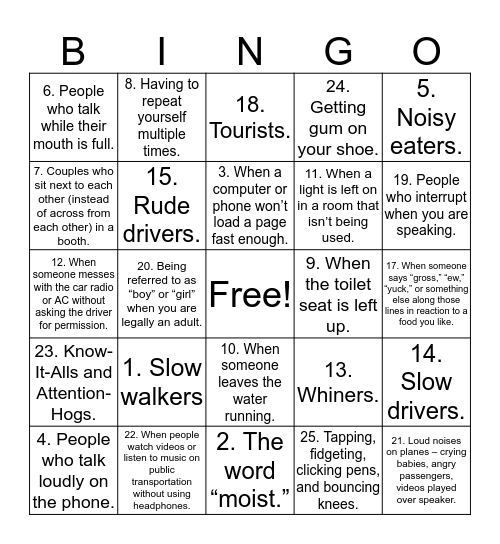Everyone has those little things that irk them, often in a social or personal setting. These idiosyncrasies, known as pet peeves, can lead to frustration and annoyance, especially when encountered frequently. Identifying and understanding pet peeve examples in person can help improve interpersonal relationships and enhance social interactions. By examining these examples, we can gain insight into our behaviors and reactions, making us more self-aware and considerate individuals.
Pet peeves vary from person to person; what bothers one individual might not faze another at all. They can arise in various situations, from casual conversations to formal gatherings. Recognizing common pet peeve examples in person can foster better communication and encourage empathy towards others' sensitivities. In this article, we will delve into various pet peeve examples in person, explore their origins, and discuss how we can manage them for a more harmonious social experience.
Ultimately, understanding pet peeves is about acknowledging human imperfections. Everyone has their quirks and habits, and by navigating through these irritations, we can create a more enjoyable environment for ourselves and those around us. Whether you’re at a party, in a meeting, or simply out with friends, knowing how to handle pet peeves can lead to a more positive experience.
What Are Some Common Pet Peeve Examples in Person?
Pet peeve examples in person often manifest in various social settings. Here are some of the most common irritations faced by individuals:
- Loud chewing or slurping sounds
- Interrupting others during conversations
- Using a phone while someone is talking
- Being late to meetings or gatherings
- Not respecting personal space
- Being overly negative or critical
- Gossiping about others
- Using filler words excessively (like "um" and "like")
Why Do Pet Peeves Exist?
Understanding the reasons behind pet peeves can help us manage our reactions to them. These irritations often stem from:
- Personal Values: Individuals have different principles and standards that shape their perceptions of acceptable behavior.
- Past Experiences: Previous negative encounters can lead to heightened sensitivity towards certain actions.
- Social Norms: Cultural backgrounds influence what is considered polite or rude in social settings.
How Can We Manage Our Pet Peeves in Person?
Dealing with pet peeves requires patience and self-awareness. Here are some strategies to help manage them:
- Practice Empathy: Try to understand the other person's perspective.
- Communicate Openly: If a pet peeve is affecting you, express your feelings calmly and respectfully.
- Focus on the Positive: Shift your attention to the positive aspects of the interaction.
- Set Boundaries: In some cases, it's okay to distance yourself from situations that consistently trigger your pet peeves.
What Are the Most Annoying Pet Peeve Examples in Person?
While pet peeves are subjective, certain examples tend to be universally annoying. Here are a few that resonate with many:
- Texting in the Middle of a Conversation: This behavior can make others feel unimportant.
- Excessive Laughing: Over-the-top laughter can be distracting and uncomfortable.
- Talking During Movies: This can ruin the experience for others.
- Not Using Basic Etiquette: Simple manners, like saying "please" and "thank you," can go a long way.
Are There Pet Peeve Examples in Person Specific to Certain Settings?
Yes, pet peeve examples can vary significantly depending on the environment. Here are some settings and the common pet peeves associated with them:
In the Workplace
- Not responding to emails or messages timely
- Excessive noise from coworkers
- Taking credit for others' work
At Social Gatherings
- Bringing up controversial topics
- Ignoring RSVP etiquette
- Drinking too much
In Public Spaces
- Cutting in line
- Talking loudly on the phone
- Leaving trash behind
What Can We Learn from Our Pet Peeves?
Identifying and reflecting on our pet peeves can lead to personal growth. Here are some lessons we can take away:
- Self-Reflection: Understanding what bothers us can reveal our values and priorities.
- Improved Communication: Recognizing our irritations can help us communicate better with others.
- Enhanced Empathy: Acknowledging that others may have their own pet peeves can foster goodwill.
Can Pet Peeve Examples in Person Affect Relationships?
Absolutely! Pet peeve examples in person can impact relationships in various ways:
- Tension: Constantly encountering a pet peeve can lead to frustration and resentment.
- Misunderstandings: Different backgrounds may lead to unintentional offenses.
- Growth: Learning to navigate pet peeves can strengthen relationships and communication skills.
How to Turn Pet Peeves into Positive Experiences?
Instead of letting pet peeves bring you down, consider these tips to transform them into constructive experiences:
- Laugh it Off: Humor can defuse tension and make situations lighter.
- Focus on Solutions: If a pet peeve is recurring, brainstorm ways to address it constructively.
- Practice Patience: Allowing yourself to be more patient can lead to healthier interactions.
In conclusion, understanding pet peeve examples in person is crucial for fostering better relationships and enhancing our social experiences. By recognizing and managing these irritations, we can not only improve our interactions with others but also develop greater self-awareness and empathy. Embracing the quirks of those around us can lead to a more harmonious and enjoyable social environment for everyone.
Morris Chestnut's Relationships: A Deep Dive Into His Romantic Life
Unraveling The Wealth Of A Legend: Joe Namath Net Worth
Bret Michaels And His Journey Through Relationships


